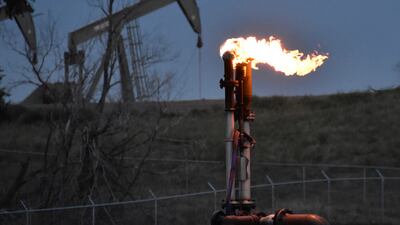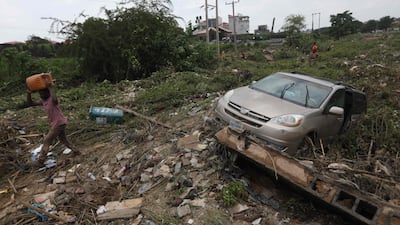A group of organisations, including Bloomberg Philanthropies and the Environmental Defence Fund, has announced an initiative to track the progress of oil and gas companies in reducing methane emissions.
The collaboration, which also includes the International Energy Agency, the UN Environment Programme and RMI, is part of a $40 million commitment by Bloomberg Philanthropies to help slash methane emissions by providing data, policy and country-level engagement, the New York-based organisation said in a statement.
Fifty oil and gas companies, representing more than 40 per cent of global oil production, made pledges on methane and carbon dioxide at the Cop28 climate conference in Dubai on Saturday.
The companies, 60 per cent of which are national oil companies, signed up to the Oil and Gas Decarbonisation Charter, which calls for net-zero emissions by 2050 or before.
They will also aim for “near-zero” upstream methane emissions and zero routine flaring by 2030.
“Methane emissions need to be drastically cut within this decade or we risk accelerating the most devastating impacts of climate change,” said Michael Bloomberg, the UN Secretary General’s special envoy on climate ambition and solutions.
“One of the most effective ways to reduce methane is through accurate data, transparency, and accountability,” said Mr Bloomberg, the founder of Bloomberg LP and Bloomberg Philanthropies.
National oil companies in emerging and developing economies are “underestimating” and therefore undercapturing methane emissions, Bloomberg Philanthropies said, adding that those countries needed support to build the technical capacity to track and reduce their emissions.
The Environmental Defence Fund and RMI (founded as the Rocky Mountain Institute) and other organisations will foster partnerships with industry trade groups, NGOs and international experts to provide technical assistance for each country to address their leaks.
Support will include aiding project management and helping to build companies’ technical capacity to manage methane independently over time.
After CO2 emissions, methane is the second largest contributor to climate change caused by humans. It is a greenhouse gas that warms up quickly, more than 80 times faster than carbon dioxide.
Under its Net Zero by 2050 scenario, the International Energy Agency has said investments worth $75 billion would be required to reduce global oil and gas methane emissions by 2030.
“Methane reductions are necessary to keep us on track for 1.5°C, so it is welcome to see the industry promising action,” said Inger Andersen, the UN Under-Secretary General.
“However, transparency is going to be critical because trust is low.”
The International Energy Agency expects global demand for oil and gas to peak by 2030 amid rising adoption of renewable energy technology and electric vehicles.
However, the current annual investment in the oil and gas sector of $800 billion is “double” what is required by 2030 in the 1.5°C scenario, the Paris-based agency has said.
But with geopolitical instability and rising demand, some investment in the production of fossil fuels would be needed to ensure a secure energy supply.
“The oil and gas industry has an urgent responsibility to be part of the solution on climate change – and taking concrete action to reduce emissions from their operations is a crucial first step,” said Fatih Birol, the IEA’s executive director.
“We look forward to tracking efforts by oil and gas producers to deliver on their commitments while encouraging even greater ambition to keep our climate goals within reach,” Mr Birol said.












